- Home
- Lois Lowry
Giver Trilogy 01 - The Giver Page 2
Giver Trilogy 01 - The Giver Read online
Page 2
“I could have sneaked a look at the list prior to the ceremony,” Father confided. “The committee always makes the list in advance, and it’s right there in the office at the Nurturing Center.
“As a matter of fact,” he went on, “I feel a little guilty about this. But I did go in this afternoon and looked to see if this year’s Naming list had been made yet. It was right there in the office, and I looked up number Thirty-six—that’s the little guy I’ve been concerned about—because it occurred to me that it might enhance his nurturing if I could call him by a name. Just privately, of course, when no one else is around.”
“Did you find it?” Jonas asked. He was fascinated. It didn’t seem a terribly important rule, but the fact that his father had broken a rule at all awed him. He glanced at his mother, the one responsible for adherence to the rules, and was relieved that she was smiling.
His father nodded. “His name—if he makes it to the Naming without being released, of course—is to be Gabriel. So I whisper that to him when I feed him every four hours, and during exercise and playtime. If no one can hear me.
“I call him Gabe, actually,” he said, and grinned.
“Gabe.” Jonas tried it out. A good name, he decided.
Though Jonas had only become a Five the year that they acquired Lily and learned her name, he remembered the excitement, the conversations at home, wondering about her: how she would look, who she would be, how she would fit into their established family unit. He remembered climbing the steps to the stage with his parents, his father by his side that year instead of with the Nurturers, since it was the year that he would be given a newchild of his own.
He remembered his mother taking the newchild, his sister, into her arms, while the document was read to the assembled family units. “Newchild Twenty-three,” the Namer had read. “Lily.”
He remembered his father’s look of delight, and that his father had whispered, “She’s one of my favorites. I was hoping for her to be the one.” The crowd had clapped, and Jonas had grinned. He liked his sister’s name. Lily, barely awake, had waved her small fist. Then they had stepped down to make room for the next family unit.
“When I was an Eleven,” his father said now, “as you are, Jonas, I was very impatient, waiting for the Ceremony of Twelve. It’s a long two days. I remember that I enjoyed the Ones, as I always do, but that I didn’t pay much attention to the other ceremonies, except for my sister’s. She became a Nine that year, and got her bicycle. I’d been teaching her to ride mine, even though technically I wasn’t supposed to.”
Jonas laughed. It was one of the few rules that was not taken very seriously and was almost always broken. The children all received their bicycles at Nine; they were not allowed to ride bicycles before then. But almost always, the older brothers and sisters had secretly taught the younger ones. Jonas had been thinking already about teaching Lily.
There was talk about changing the rule and giving the bicycles at an earlier age. A committee was studying the idea. When something went to a committee for study, the people always joked about it. They said that the committee members would become Elders by the time the rule change was made.
Rules were very hard to change. Sometimes, if it was a very important rule—unlike the one governing the age for bicycles—it would have to go, eventually, to The Receiver for a decision. The Receiver was the most important Elder. Jonas had never even seen him, that he knew of; someone in a position of such importance lived and worked alone. But the committee would never bother The Receiver with a question about bicycles; they would simply fret and argue about it themselves for years, until the citizens forgot that it had ever gone to them for study.
His father continued. “So I watched and cheered when my sister, Katya, became a Nine and removed her hair ribbons and got her bicycle,” Father went on. “Then I didn’t pay much attention to the Tens and Elevens. And finally, at the end of the second day, which seemed to go on forever, it was my turn. It was the Ceremony of Twelve.”
Jonas shivered. He pictured his father, who must have been a shy and quiet boy, for he was a shy and quiet man, seated with his group, waiting to be called to the stage. The Ceremony of Twelve was the last of the Ceremonies. The most important.
“I remember how proud my parents looked—and my sister, too; even though she wanted to be out riding the bicycle publicly, she stopped fidgeting and was very still and attentive when my turn came.
“But to be honest, Jonas,” his father said, “for me there was not the element of suspense that there is with your Ceremony. Because I was already fairly certain of what my Assignment was to be.”
Jonas was surprised. There was no way, really, to know in advance. It was a secret selection, made by the leaders of the community, the Committee of Elders, who took the responsibility so seriously that there were never even any jokes made about Assignments.
His mother seemed surprised, too. “How could you have known?” she asked.
His father smiled his gentle smile. “Well, it was clear to me—and my parents later confessed that it had been obvious to them, too—what my aptitude was. I had always loved the newchildren more than anything. When my friends in my age group were holding bicycle races, or building toy vehicles or bridges with their construction sets, or—”
“All the things I do with my friends,” Jonas pointed out, and his mother nodded in agreement.
“I always participated, of course, because as children we must experience all of those things. And I studied hard in school, as you do, Jonas. But again and again, during free time, I found myself drawn to the newchildren. I spent almost all of my volunteer hours helping in the Nurturing Center. Of course the Elders knew that, from their observation.”
Jonas nodded. During the past year he had been aware of the increasing level of observation. In school, at recreation time, and during volunteer hours, he had noticed the Elders watching him and the other Elevens. He had seen them taking notes. He knew, too, that the Elders were meeting for long hours with all of the instructors that he and the other Elevens had had during their years of school.
“So I expected it, and I was pleased, but not at all surprised, when my Assignment was announced as Nurturer,” Father explained.
“Did everyone applaud, even though they weren’t surprised?” Jonas asked.
“Oh, of course. They were happy for me, that my Assignment was what I wanted most. I felt very fortunate.” His father smiled.
“Were any of the Elevens disappointed, your year?” Jonas asked. Unlike his father, he had no idea what his Assignment would be. But he knew that some would disappoint him. Though he respected his father’s work, Nurturer would not be his wish. And he didn’t envy Laborers at all.
His father thought. “No, I don’t think so. Of course the Elders are so careful in their observations and selections.”
“I think it’s probably the most important job in our community,” his mother commented.
“My friend Yoshiko was surprised by her selection as Doctor,” Father said, “but she was thrilled. And let’s see, there was Andrei—I remember that when we were boys he never wanted to do physical things. He spent all the recreation time he could with his construction set, and his volunteer hours were always on building sites. The Elders knew that, of course. Andrei was given the Assignment of Engineer and he was delighted.”
“Andrei later designed the bridge that crosses the river to the west of town,” Jonas’s mother said. “It wasn’t there when we were children.”
“There are very rarely disappointments, Jonas. I don’t think you need to worry about that,” his father reassured him. “And if there are, you know there’s an appeal process.” But they all laughed at that—an appeal went to a committee for study.
“I worry a little about Asher’s Assignment,” Jonas confessed. “Asher’s such fun. But he doesn’t really have any serious interests. He makes a game out of everything.”
His father chuckled. “You know,” he said, “I remember when Asher w
as a newchild at the Nurturing Center, before he was named. He never cried. He giggled and laughed at everything. All of us on the staff enjoyed nurturing Asher.”
“The Elders know Asher,” his mother said. “They’ll find exactly the right Assignment for him. I don’t think you need to worry about him. But, Jonas, let me warn you about something that may not have occurred to you. I know I didn’t think about it until after my Ceremony of Twelve.”
“What’s that?”
“Well, it’s the last of the Ceremonies, as you know. After Twelve, age isn’t important. Most of us even lose track of how old we are as time passes, though the information is in the Hall of Open Records, and we could go and look it up if we wanted to. What’s important is the preparation for adult life, and the training you’ll receive in your Assignment.”
“I know that,” Jonas said. “Everyone knows that.”
“But it means,” his mother went on, “that you’ll move into a new group. And each of your friends will. You’ll no longer be spending your time with your group of Elevens. After the Ceremony of Twelve, you’ll be with your Assignment group, with those in training. No more volunteer hours. No more recreation hours. So your friends will no longer be as close.”
Jonas shook his head. “Asher and I will always be friends,” he said firmly. “And there will still be school.”
“That’s true,” his father agreed. “But what your mother said is true as well. There will be changes.”
“Good changes, though,” his mother pointed out. “After my Ceremony of Twelve, I missed my childhood recreation. But when I entered my training for Law and Justice, I found myself with people who shared my interests. I made friends on a new level, friends of all ages.”
“Did you still play at all, after Twelve?” Jonas asked.
“Occasionally,” his mother replied. “But it didn’t seem as important to me.”
“I did,” his father said, laughing. “I still do. Every day, at the Nurturing Center, I play bounce-on-the-knee, and peek-a-boo, and hug-the-teddy.” He reached over and stroked Jonas’s neatly trimmed hair. “Fun doesn’t end when you become Twelve.”
Lily appeared, wearing her nightclothes, in the doorway. She gave an impatient sigh. “This is certainly a very long private conversation,” she said. “And there are certain people waiting for their comfort object.”
“Lily,” her mother said fondly, “you’re very close to being an Eight, and when you’re an Eight, your comfort object will be taken away. It will be recycled to the younger children. You should be starting to go off to sleep without it.”
But her father had already gone to the shelf and taken down the stuffed elephant which was kept there. Many of the comfort objects, like Lily’s, were soft, stuffed, imaginary creatures. Jonas’s had been called a bear.
“Here you are, Lily-billy,” he said. “I’ll come help you remove your hair ribbons.”
Jonas and his mother rolled their eyes, yet they watched affectionately as Lily and her father headed to her sleepingroom with the stuffed elephant that had been given to her as her comfort object when she was born. His mother moved to her big desk and opened her briefcase; her work never seemed to end, even when she was at home in the evening. Jonas went to his own desk and began to sort through his school papers for the evening’s assignment. But his mind was still on December and the coming Ceremony.
Though he had been reassured by the talk with his parents, he hadn’t the slightest idea what Assignment the Elders would be selecting for his future, or how he might feel about it when the day came.
3
“Oh, look!” Lily squealed in delight. “Isn’t he cute? Look how tiny he is! And he has funny eyes like yours, Jonas!” Jonas glared at her. He didn’t like it that she had mentioned his eyes. He waited for his father to chastise Lily. But Father was busy unstrapping the carrying basket from the back of his bicycle. Jonas walked over to look.
It was the first thing Jonas noticed as he looked at the newchild peering up curiously from the basket. The pale eyes.
Almost every citizen in the community had dark eyes. His parents did, and Lily did, and so did all of his group members and friends. But there were a few exceptions: Jonas himself, and a female Five who he had noticed had the different, lighter eyes. No one mentioned such things; it was not a rule, but was considered rude to call attention to things that were unsettling or different about individuals. Lily, he decided, would have to learn that soon, or she would be called in for chastisement because of her insensitive chatter.
Father put his bike into its port. Then he picked up the basket and carried it into the house. Lily followed behind, but she glanced back over her shoulder at Jonas and teased, “Maybe he had the same Birthmother as you.”
Jonas shrugged. He followed them inside. But he had been startled by the newchild’s eyes. Mirrors were rare in the community; they weren’t forbidden, but there was no real need of them, and Jonas had simply never bothered to look at himself very often even when he found himself in a location where a mirror existed. Now, seeing the newchild and its expression, he was reminded that the light eyes were not only a rarity but gave the one who had them a certain look—what was it? Depth, he decided; as if one were looking into the clear water of the river, down to the bottom, where things might lurk which hadn’t been discovered yet. He felt self-conscious, realizing that he, too, had that look.
He went to his desk, pretending not to be interested in the newchild. On the other side of the room, Mother and Lily were bending over to watch as Father unwrapped its blanket.
“What’s his comfort object called?” Lily asked, picking up the stuffed creature which had been placed beside the newchild in his basket.
Father glanced at it. “Hippo,” he said.
Lily giggled at the strange word. “Hippo,” she repeated, and put the comfort object down again. She peered at the unwrapped newchild, who waved his arms.
“I think newchildren are so cute,” Lily sighed. “I hope I get assigned to be a Birthmother.”
“Lily!” Mother spoke very sharply. “Don’t say that. There’s very little honor in that Assignment.”
“But I was talking to Natasha. You know the Ten who lives around the corner? She does some of her volunteer hours at the Birthing Center. And she told me that the Birthmothers get wonderful food, and they have very gentle exercise periods, and most of the time they just play games and amuse themselves while they’re waiting. I think I’d like that,” Lily said petulantly.
“Three years,” Mother told her firmly. “Three births, and that’s all. After that they are Laborers for the rest of their adult lives, until the day that they enter the House of the Old. Is that what you want, Lily? Three lazy years, and then hard physical labor until you are old?”
“Well, no, I guess not,” Lily acknowledged reluctantly.
Father turned the newchild onto his tummy in the basket. He sat beside it and rubbed its small back with a rhythmic motion. “Anyway, Lily-billy,” he said affectionately, “the Birthmothers never even get to see newchildren. If you enjoy the little ones so much, you should hope for an Assignment as Nurturer.”
“When you’re an Eight and start your volunteer hours, you can try some at the Nurturing Center,” Mother suggested.
“Yes, I think I will,” Lily said. She knelt beside the basket. “What did you say his name is? Gabriel? Hello, Gabriel,” she said in a singsong voice. Then she giggled. “Ooops,” she whispered. “I think he’s alseep. I guess I’d better be quiet.”
Jonas turned to the school assignments on his desk. Some chance of that, he thought. Lily was never quiet. Probably she should hope for an Assignment as Speaker, so that she could sit in the office with the microphone all day, making announcements. He laughed silently to himself, picturing his sister droning on in the self-important voice that all the Speakers seemed to develop, saying things like, ATTENTION, THIS IS A REMINDER TO FEMALES UNDER NINE THAT HAIR RIBBONS ARE TO BE NEATLY TIED AT ALL TIMES.
Everyone had known, he remembered with humiliation, that the announcement ATTENTION, THIS IS A REMINDER TO MALE ELEVENS THAT OBJECTS ARE NOT TO BE REMOVED FROM THE RECREATION AREA AND THAT SNACKS ARE TO BE EATEN, NOT HOARDED had been specifically directed at him, the day last month that he had taken an apple home. No one had mentioned it, not even his parents, because the public announcement had been sufficient to produce the appropriate remorse. He had, of course, disposed of the apple and made his apology to the Recreation Director the next morning, before school.
Jonas thought again about that incident. He was still bewildered by it. Not by the announcement or the necessary apology; those were standard procedures, and he had deserved them—but by the incident itself. He probably should have brought up his feeling of bewilderment that very evening when the family unit had shared their feelings of the day. But he had not been able to sort out and put words to the source of his confusion, so he had let it pass.
It had happened during the recreation period, when he had been playing with Asher. Jonas had casually picked up an apple from the basket where the snacks were kept, and had thrown it to his friend. Asher had thrown it back, and they had begun a simple game of catch.
There had been nothing special about it; it was an activity that he had performed countless times: throw, catch; throw, catch. It was effortless for Jonas, and even boring, though Asher enjoyed it, and playing catch was a required activity for Asher because it would improve his hand-eye coordination, which was not up to standards.
But suddenly Jonas had noticed, following the path of the apple through the air with his eyes, that the piece of fruit had—well, this was the part that he couldn’t adequately understand—the apple had changed. Just for an instant. It had changed in mid-air, he remembered. Then it was in his hand, and he looked at it carefully, but it was the same apple. Unchanged. The same size and shape: a perfect sphere. The same nondescript shade, about the same shade as his own tunic.

 The Willoughbys
The Willoughbys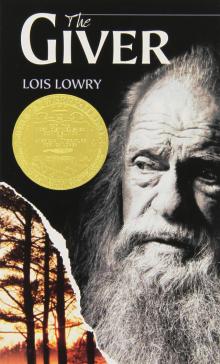 The Giver
The Giver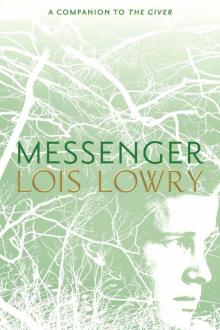 Messenger
Messenger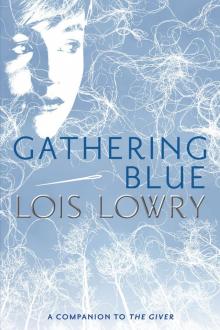 Gathering Blue
Gathering Blue Gooney Bird and All Her Charms
Gooney Bird and All Her Charms Taking Care of Terrific
Taking Care of Terrific Gooney Bird on the Map
Gooney Bird on the Map The Birthday Ball
The Birthday Ball Anastasia's Chosen Career
Anastasia's Chosen Career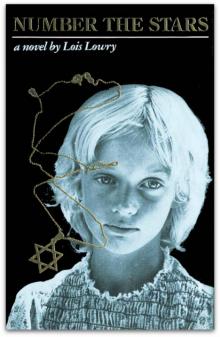 Number the Stars
Number the Stars The Silent Boy
The Silent Boy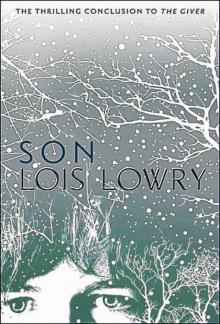 Son
Son Attaboy, Sam!
Attaboy, Sam! Gooney Bird Greene
Gooney Bird Greene The One Hundredth Thing About Caroline
The One Hundredth Thing About Caroline Anastasia Has the Answers
Anastasia Has the Answers Your Move, J. P.!
Your Move, J. P.!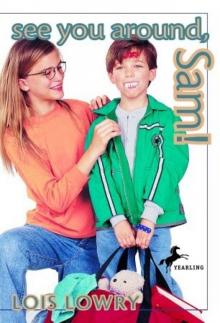 See You Around, Sam!
See You Around, Sam! All About Sam
All About Sam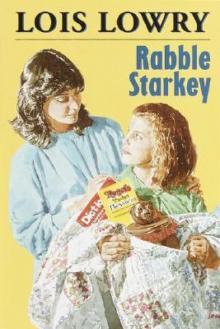 Rabble Starkey
Rabble Starkey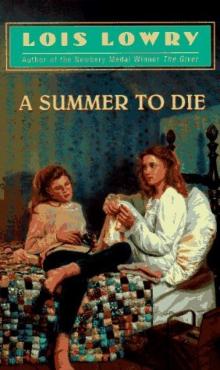 A Summer to Die
A Summer to Die Anastasia at This Address
Anastasia at This Address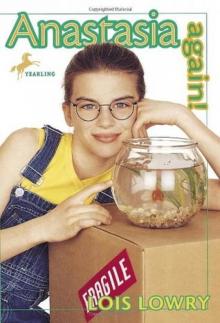 Anastasia Again!
Anastasia Again! Gooney the Fabulous
Gooney the Fabulous Gossamer
Gossamer Anastasia, Absolutely
Anastasia, Absolutely Gooney Bird Is So Absurd
Gooney Bird Is So Absurd Anastasia at Your Service
Anastasia at Your Service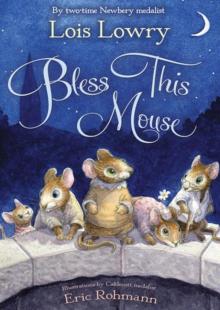 Bless this Mouse
Bless this Mouse Find a Stranger, Say Goodbye
Find a Stranger, Say Goodbye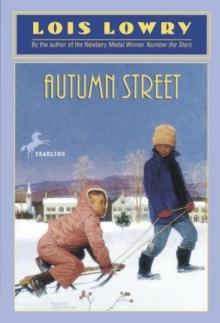 Autumn Street
Autumn Street Stay Keepers Story
Stay Keepers Story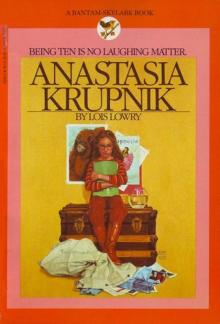 Anastasia Krupnik
Anastasia Krupnik Zooman Sam
Zooman Sam On the Horizon
On the Horizon Anastasia, Ask Your Analyst
Anastasia, Ask Your Analyst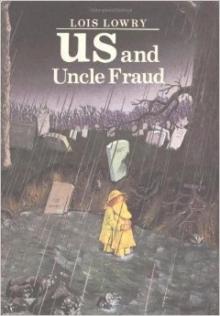 Us and Uncle Fraud
Us and Uncle Fraud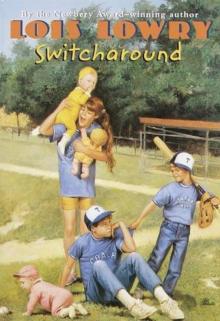 Switcharound
Switcharound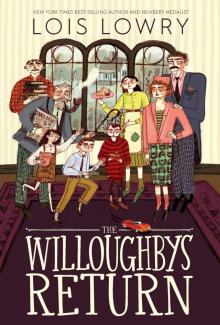 The Willoughbys Return
The Willoughbys Return Dear America: Like the Willow Tree
Dear America: Like the Willow Tree Shining On
Shining On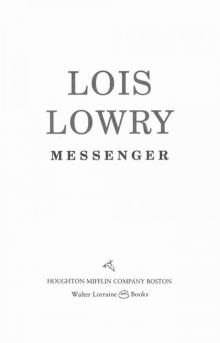 Messenger (The Giver Trilogy)
Messenger (The Giver Trilogy)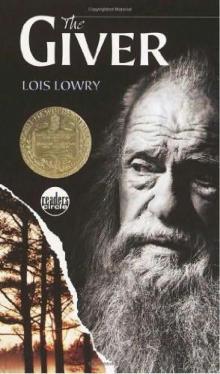 Giver Trilogy 01 - The Giver
Giver Trilogy 01 - The Giver